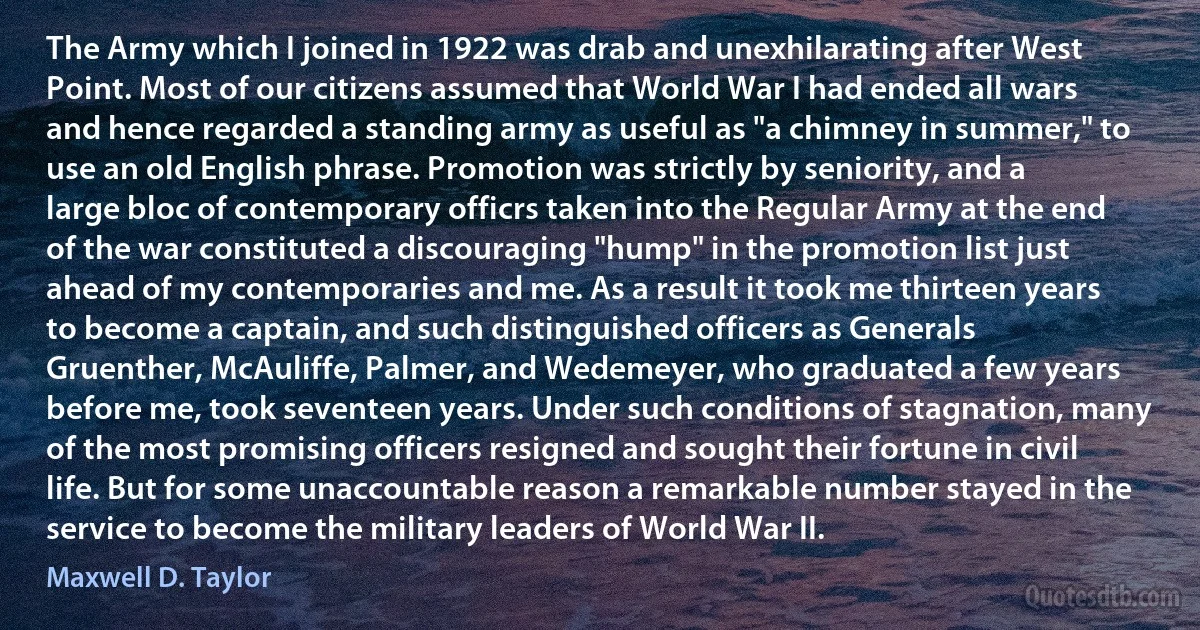
The Army which I joined in 1922 was drab and unexhilarating after West Point. Most of our citizens assumed that World War I had ended all wars and hence regarded a standing army as useful as "a chimney in summer," to use an old English phrase. Promotion was strictly by seniority, and a large bloc of contemporary officrs taken into the Regular Army at the end of the war constituted a discouraging "hump" in the promotion list just ahead of my contemporaries and me. As a result it took me thirteen years to become a captain, and such distinguished officers as Generals Gruenther, McAuliffe, Palmer, and Wedemeyer, who graduated a few years before me, took seventeen years. Under such conditions of stagnation, many of the most promising officers resigned and sought their fortune in civil life. But for some unaccountable reason a remarkable number stayed in the service to become the military leaders of World War II.
Maxwell D. TaylorRelated topics
army chimney contemporary contemporaries discouraging end english few fortune hump large life number palmer point promising reason result seek seniority service seventeen stagnation standing summer take under use war west world promotion years blocRelated quotes
Microeconomics, including the study of individual choice and of group choice in market and nonmarket processes, has generally been considered a field science as distinct from an experimental science. Hence microeconomics has sometimes been classified as "non-experimental" and closer methodologically to meteorology and astronomy than to physics and experimental psychology (Marschak, 1950, p. 3; Samuelson, 1973, p. 7). But the question of using experimental or nonexperimental techniques is largely a matter of cost, and generally the cost of conducting the most ambitious and informative experiments in astronomy, meteorology, and economics varies from prohibitive down to considerable. The cost of experimenting with different solar system planetary arrangements, different atmospheric conditions, and different national unemployment rates, each under suitable controls, must be regarded as prohibitive.

Vernon L. Smith
The shattering of modern culture is the result, on the plane of ideological struggle, of the chaotic crisis of these antagonisms. The new desires that are taking shape are presented in distorted form: present-day resources could enable them to be fulfilled, but the anachronistic economic structure is incapable of developing these resources to such ends. Ruling-class ideology has meanwhile lost all coherence because of the depreciation of its successive conceptions of the world (a depreciation which leads the ruling class to historical indecision and uncertainty); because of the coexistence of a range of mutually contradictory reactionary ideologies (such as Christianity and social-democracy); and because of the mixing into contemporary Western culture of a number of only recently appreciated features of several foreign civilizations. The main goal of ruling-class ideology is therefore to maintain this confusion.

Guy Debord
The time has not yet come for dealing with the world illusion on a large scale, for the race is not adequately mental nor has the illusion (which is, as I have stated, pre-eminently the result of the misinterpretation of ideas) reached its height. But the hour has struck for the first steps to be taken in the dissipation of glamour, and the hold of glamour upon the race should be appreciably lessened in the future. Hence the practical training now being given in this group in their own lives; hence also the intended teaching later to be given to the group-if they measure up to the opportunity-which will enable them to aid in the concerted and planned attack upon the world glamour. Wrestle therefore with your personal problems along these lines, my brothers, for in this way you will gain facility in discernment, in clear precise action, and in strengthened understanding.

Alice Bailey
Art, moreover, is taste. It is the reflection of the artist's heart upon all the objects that he creates. It is the smile of the human soul upon the house and on the furnishing. It is the charm of thought and of sentiment embodied in all that is of use to man. But how many of our contemporaries fed the necessity of taste in house or furnishing? Formerly, in old France, Art was everywhere. The smallest bourgeois, even the peasant, made use only of articles which pleased the eye. Their chairs, their tables, their pitchers and their pots were beautiful. Today Art is banished from daily life. People say that the useful need not be beautiful. All is ugly, all is made in haste and without grace by stupid machines. The artist is regarded as an antagonist. Ah, my dear Gsell, you wish to jot down an artist's musings. Let me look at you! You really are an extraordinary man!

Auguste Rodin
[O]ne may confidently hope, that this will not be the instance, in which the last blow will be struck at that manly, that generous mode of terminating quarrels between the common people, a mode by which the common people of England have, for ages, been distinguished from those of all other countries. ... [T]he occasion calls for some remark upon those exertions, which, of late, have been, and which yet are, making in every part of the country, with the obvious, and, in many instances, with the declared, intention, of utterly eradicating the practice of boxing; than which, I am thoroughly persuaded, nothing could be more injurious, whether considered as to its effects in civil life, or in its higher and more important effects on the people regarded as the members of a state, and, of course, always opposed to some other state, and therefore always liable to be called upon to perform the duties of war.

William Cobbett
